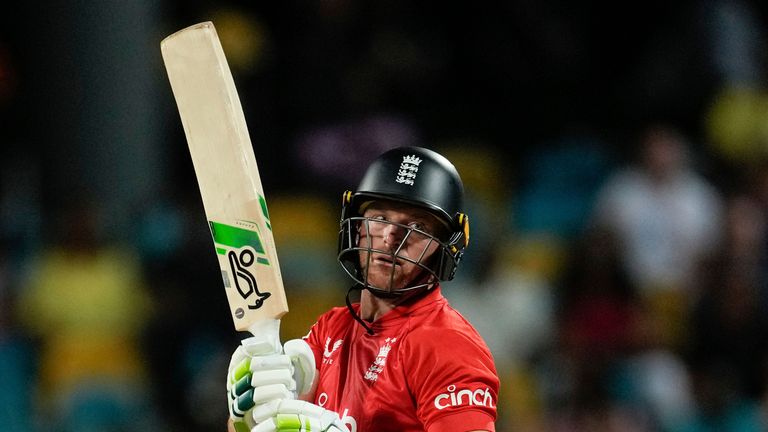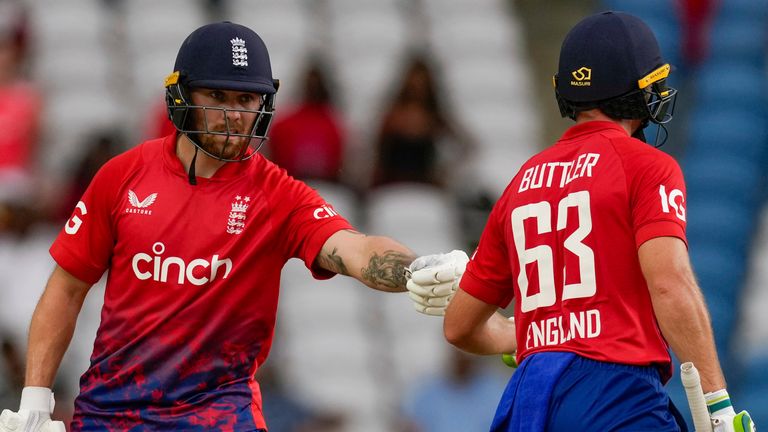Jos Buttler believes England’s tour of the West Indies was a “success” despite losing both ODI and T20 series.
England leave the Caribbean empty-handed after 2-1 and 3-2 losses in the ODIs and T20s against a side below them in the rankings in both formats, and just weeks on from a shock World Cup group-stage exit.
Defeat in Thursday’s T20 series decider was England’s 11th loss in 17 limited-overs matches this winter, but Buttler argued there are reasons to regard this trip as a qualified success.
England’s 267 for three in the penultimate T20 was their highest score in the format and they equalled their second highest run-chase in the third match, while several individuals have pushed their case.
“I think so, yeah, ” Buttler said when asked if the tour had been a success. “Obviously some players have stood up and done really well.
“You want to win and I think we all wanted to win the series and it’s hard to say when you’ve lost, but I think we’ve found out some good things.
“There’s been lots of ups and downs throughout the year but it’s always important to keep looking forward. We played some really good cricket for the majority of the series. It’s been a good series.”
Buttler calls on England to work on death bowling
Buttler zeroed in on the “thankless task” of death bowling as one area England can improve upon ahead of the defence of their T20 World Cup crown in six months’ time.
England may have lost both white-ball series against the West Indies but gained valuable insight into pitches and conditions they may encounter in the Caribbean and United States next June.
Only Adil Rashid and Reece Topley among the touring bowlers kept their economy rate below nine an over, while the Windies’ conveyor belt of six hitters frequently pummelled the ropes towards the back end.
Buttler acknowledged stopping a Windies juggernaut is easier said than done but England’s white-ball captain feels his bowlers can try to master keeping runs at a premium at the crunch phase.
“For every team in T20 cricket death bowling is a massive area that everyone has to look at and we’re the same as a team,. If you can execute your yorkers they’re still the best ball,” Buttler continued.
“Managing expectations is a big part of it. Knowing what’s a win and what’s a loss. Getting an over to only go for 13 instead of 18 or those kind of things.
“We know the way the game has gone, batters are fantastic at the end of the innings at clearing the ropes and the innovation. So it is a thankless task.
“I think you have to manage those expectations but you’re always trying to upskill and get better.”
Buttler on Salt being wicketkeeper
Buttler handed wicketkeeping duties over to Phil Salt for the final two matches but was coy about whether he intends for the switch to become a permanent one.
“I’d probably take a few days to sort of reflect on that. It’s nice sometimes during the over to be closer to the bowler, but when you’re keeping wicket you can always run down and run back,” he added.
“I like the view as a wicketkeeper behind the stumps, to be able to see exactly what’s happening, but I enjoy fielding as well. I don’t really have any huge preference either way.”
England’s next white-ball assignment is not until a T20 series against Pakistan in May so Buttler and head coach Matthew Mott can take stock after a difficult past few months.
“I’ve had some low moments, for sure. It was a huge disappointment in my career, that World Cup that’s just gone,” said Buttler.
“But after you let the dust settle there’s huge motivation, determination to have another crack and keep going. That desire still burns strongly.”
What’s next for England?
England’s Test team return to action next month when they head to India for a five-match series, starting with the first Test in Hyderabad on January 25. The next action for the white-ball side is on home soil in May when Pakistan head to England for a four-match T20I series ahead of next year’s World Cup.









